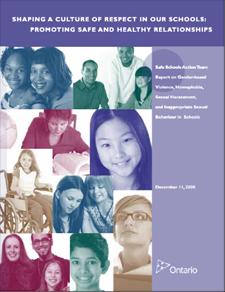The Ontario Safe Schools Report released last month calls for education on sexual orientation to begin earlier and be more comprehensive.
But the report still recommends allowing parents to withdraw their children from classes teaching subjects they disagree with, such as homosexuality. It also contains no means of forcing teachers to learn about the subject matter.
“In some cases it’s being much clearer about what you must cover or moving material into earlier grades,” says Liz Sandals, the Guelph MPP who chaired the Safe Schools Action Team that wrote the report for provincial education minister Kathleen Wynne.
Sandals says the report calls for a much wider focus on sexual issues in Health and Physical Education classes across the province.
“The Ministry of Education must ensure that the topics of gender-based violence, homophobia, sexual harassment and inappropriate sexual behaviour are introduced in an age-appropriate way, beginning in Grade 6, and are developed and studied in greater depth in Grades 7, 8 and 9,” states the report.
The report calls on the ministry to “revise the health and physical education curriculum so that: by Grade 6 all students will learn about gender stereotypes and homophobia; by Grade 7 all students will learn about sexually transmitted infections and preventive measures, and about various forms of contraception including condoms; by Grade 8 all students will explicitly learn about sexual identity, dating violence and contraceptives; and by Grade 9 all students will learn specifically about gender-based violence, homophobia,sexual harassment and inappropriate sexual behaviour in more depth.”
The report also calls on school boards to ensure that “students in the publicly funded system are exposed to healthy relationships/sexuality topics” and that the topics are raised in as many different classes as possible.
Sandals says that all publicly funded school boards, including Catholic ones, will have to follow the curriculum.
“In the case of the school board saying we don’t want to teach that, we’re saying this is what you have to teach.”
But Sandals says health class is only compulsory through Grade 9 and that the report is not suggesting parents be prevented from removing their children from classes.
“The vast majority of students don’t take health after Grade 9,” she says. “We’re not doing anything to change the parents’ ability to withdraw their child from a particular class.”
Sandals also says the implementation of such a curriculum will probably depend more on the materials that are made available than on training teachers.
“Most teachers feel really uncomfortable dealing with those subjects,” she says. “You have to provide them with really good resources. And there are people in the community who are much more expert on these issues so you might want to partner with them.”
Sandals says the ministry can’t force bodies such as the Ontario College of Teachers — which licenses and disciplines teachers — or faculties of education to work sexual orientation into their training.
“The College of Teachers is an independent, self-governing body,” she says. “When it gets to faculties of education, saying you shall include this in a course at university really doesn’t work. They are independent bodies.”
But Sandals says school staff will be expected to do more in terms of addressing homophobia and in reporting incidents to police.
“If you hear kids making homophobic slurs you have to stop them,” she says. “The minister had asked us to look at the issues around reporting. It’s actually laid out in school board/police protocols. Every school board has that protocol in place. What we found, however, is that principals didn’t always follow that.”
Sandals says the team also found that teachers didn’t always report incidents to the principal of a school.
“You would have thought that was fairly intuitively obvious,” she says, “but in some schools we were running into incidents where teachers were aware of quite serious things and they didn’t pass that along to the principal.”
Sandals says the ministry of education will not be able to impose penalties on school staff who don’t act to protect students.
“When you come around to actions or misactions of individual principals or teachers, that’s where the College of Teachers comes in,” she says.
The report was officially released on Dec 11 and presented to Wynne. Sandals says Wynne doesn’t have to accept or implement the recommendations.
“But when we did the official handover the minister did comment at that point that she would be implementing the report.”


 Why you can trust Xtra
Why you can trust Xtra


